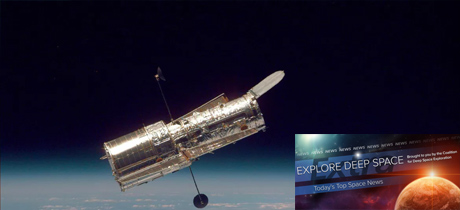In Today’s Deep Space Extra… Space council advisory group to study role of human space exploration supporting science. NASA works to troubleshoot a problem with the Hubble Space Telescope’s primary camera. The dragon in Orion’s nebula.
Human Space Exploration
Space council advisory group to study role of human space exploration supporting science
SpaceNews.com (1/10): The Users’ Advisory Group (UAG), formed last year to assist the White House National Space Council with policy making, is assessing how the nation’s future human deep space exploration strategy can benefit a range of space science pursuits, members of the advisory group explained this week at a meeting of the American Astronomical Society (AAS) in Seattle.
Space Science
Hubble space telescope’s team works to revive camera amid NASA shutdown
Geekwire.com (1/9): NASA reported difficulties with the Hubble space telescope’s primary camera, the Wide Field Camera 3, earlier this week. The difficulties, which the agency’s Hubble team is troubleshooting, have not affected three other primary instruments. Controllers say the camera’s electronics are redundant and could help to overcome the instrument’s shutdown at mid-day on Tuesday.
More trouble for the Hubble telescope as a primary camera malfunctions
New York Times (1/10): Officials at the Space Telescope Science Institute, headquarters for astronomers using the near 29-year-old Hubble space telescope, are hopeful of overcoming a yet to be diagnosed problem with Hubble’s primary camera. However, it may be another sign the break through observatory is showing its age.
Sky and Telescope (1/9): The Orion nebula is a well-known site for active star formation among astronomers. NASA’s airborne SOFIA observatory has captured an image of another side of the cosmic turmoil. It’s the strange shape in the gas clouds shaped by the dynamic activity. The display was a topic for the American Astronomical Society (AAS) winter meeting underway this week in Seattle.
Shutdown grounds NASA’s airborne observatory
SpaceNews.com (1/9): NASA’s airborne SOFIA observatory has been grounded since the partial U.S. government shutdown that commenced on December 22. Other NASA spacecraft operations have continued. Once the shutdown ends, SOFIA observations should commence again, though discussions are ongoing about replanning the lost observation opportunities caused by the shutdown.
Canadian radio telescope takes the search for puzzling fast radio bursts into a new era
Geekwire.com (1/9): The American Astronomical Society’s (AAS) winter meeting in Seattle on Wednesday provided a forum for the accomplishments of the Canadian Hydrogen Intensity Mapping Experiment, a journey into the mysteries of cosmic fast radio bursts.
A wild ‘interstellar probe’ mission idea is gaining momentum
Space.com (1/9): The Johns Hopkins University’s Applied Physics Lab is leading an international assessment of a possible spacecraft mission to go further in space than ever before, perhaps 90 billion miles and well beyond NASA’s Voyager 1, launched in 1977 and the first spacecraft to go interstellar in 2012.
Other News
Wicker, Cantwell to lead Senate Commerce Committee; appropriations leadership remains the same
Spacepolicyonline.com (1/9): The U.S. Senate Commerce, Science and Transportation Committee, which shapes policy for NASA, NOAA, the FAA and commercial space activities, is undergoing leadership changes with the new Congress. Mississippi’s Roger Wicker takes over the chairmanship from South Dakota’s John Thune. Washington’s Maria Cantwell replaces Florida’s Bill Nelson as the ranking minority member. Unlike in the House, the Republican party maintained a majority in the Senate in the aftermath of the November midterm elections.
Rogozin wants official explanation
Spacepolicyonline.com (1/9): Dmitry Rogozin, head of Russia’s space agency, is seeking an “official” explanation for the withdrawal of an invitation extended by NASA Administrator Jim Bridenstine in October to visit the U.S. for a discussion of space relations. The invitation was withdrawn earlier this month by Bridenstine in response to objections related to Rogozin’s role in Russia’s annexation of Crimea. That led to U.S. sanctions, with one target being Rogozin, who was then Russia’s deputy prime minister. The latest issue has left what Rogozin calls a “nasty taste in our mouths,” and he blames NASA’s stance on tensions between the White House and Congress that could influence future relations. Russia has offered the only means of astronaut transportation to and from the International Space Station (ISS) since NASA’s shuttle fleet was retired in 2011.

